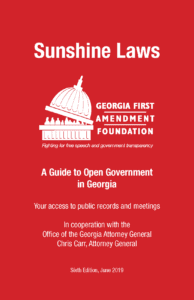Georgia’s Sunshine Laws are simply a pair of Acts that provide access and transparency to government bodies and their activities. These laws are important because they discourage corruption and increase trust between the public and these bodies. The Sunshine Laws refer to the The Open Meetings Act and the Open Records Act.
Fundamental to a healthy democracy is the ability of the public to make good decisions based on good information. That means government must be transparent, even if it is uncomfortable for the public officials in whom we have placed our trust.
Sunshine Laws: A Guide to Open Government in Georgia
Who do the Sunshine Laws apply to?
Georgia’s Sunshine Laws provide an avenue for citizens to have the legal right to have access to public meetings and documents of public record and they apply to ALL entities that are an agency of the state including:
- Every state department, agency, board, bureau, commission, public corporation and authority
- Every county, city, school district and other political subdivision
- Every department, agency, board, bureau, commission, authority and similar body of each county, city or other political subdivision of the state
- Every local, regional or other authority established pursuant to state law
- Nonprofit organizations that receive more than one-third of their funds from a direct allocation of funds from the governing authority of an agency
What kinds of meetings are covered by The Open Meetings Act?
Georgia’s Open Meetings Act requires that state and local governmental bodies conduct their business so the public can review and monitor elected officials and others working on their behalf. The law requires that government meetings be open to the public. The law also requires governmental bodies to provide reasonable notice of all meetings.
Sunshine Laws: A Guide to Open Government in Georgia
Under the Open Meetings Act, each of the following must transact business in the open:
- City councils
- County commissions
- Regional development authorities
- Library boards
- School boards
- Commissions or authorities, such as hospital authorities, established by state or local governments
- Planning commissions
- Zoning boards
- Most committees of the University System of Georgia
- Nonprofit corporations operating public hospitals
The gist: the law applies to nearly every group that performs any function of a government entity and any meeting when there is a quorum of the members of an agency and there is a discussion or presentation related to policy or there is any action taken (like a motion or a vote).
The meetings could be in person, on zoom or on the phone — it doesn’t matter! They must be open to the public. There are VERY few exceptions. In addition to having access to the meetings, you’re allowed to make audio and video recordings of the meetings.
The rules about giving notice for meetings
For regular meetings, the meeting notices must be posted one week before the meeting. The notices must be placed in an easy to find place on their website, if they have one, and at the location of the meeting.
For special-called meetings or emergency meetings, a physical notice must be posted 24-hours before the meeting at the meeting location. There are also rules regarding ensuring that the notice is posted in the “legal organ” — such as the local newspaper or local media outlets.
What about the agendas and minutes for these meetings?
The agenda should be made available upon request and it should be posted as far in advance as possible. Agendas are often amended at the start of a meeting, but once posted, should not be changed until a motion to amend the agenda is made at the meeting.
Minutes are to be kept in writing and made available after the next meeting. This means that a meeting in March would have minutes available within one day after the next meeting of the body, in April. The minutes have to have the names of the members present, descriptions of the motions or proposals made along with the names of the members who proposed or seconded the motions, as well as a record of all votes and a summary of the meeting also must be provided by the agency within two business
days following the meeting.
What kinds of records are covered by the The Open Records Act?
You have the legal right to see or inspect and copy all public records. You may be charged a reasonable fee for both the time it takes to assemble your request and for the price of the copies, usually not more than 10 cents per page. There is no charge for the first 15 minutes that it takes for the lowest-paid, full-time employee that has the necessary skills to perform the request. After that, you’re charged the hourly rate of that employee for the time incurred. These agencies are required to provide “the most economical means reasonably calculated to identify and produce responsive, non-excluded documents,” and they can’t charge you for their attorney’s fees if they seek guidance on whether or not the records are subject to the law. Often times, the fees that you’re being charged will be associated with the time it takes to redact parts of the document that are exempt.
The types of records that The Open Records Law includes are:
- Documents
- Papers
- Letters
- Maps
- Books
- Tapes
- Photographs
- Computer-based or -generated information
- Data
- Data fields
- Similar material prepared and maintained or received by an agency
In most cases, you can ask for and receive open records requests digitally. There are instances where there may not be a digital record (for example, handwritten or typed, hard copies of meeting minutes) or the volume of the record is so large, that it cannot be attached to an email. In these instances, an agency may opt to print the records, upload the records onto a thumb drive, or invite you to come and review the document in full so that you can specify which pages of the document you’d like to be copied.

To learn more about the Sunshine Laws, we encourage you to check out the guide written by the Georgia First Amendment Foundation, Sunshine Laws: A Guide to Open Government in Georgia.
The Georgia First Amendment Foundation is the only agency in Georgia that is dedicated and focused exclusively on advocating for government transparency, free speech rights and access to public information, meetings and proceedings.




